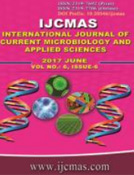


 National Academy of Agricultural Sciences (NAAS)
National Academy of Agricultural Sciences (NAAS)

|
PRINT ISSN : 2319-7692
Online ISSN : 2319-7706 Issues : 12 per year Publisher : Excellent Publishers Email : editorijcmas@gmail.com / submit@ijcmas.com Editor-in-chief: Dr.M.Prakash Index Copernicus ICV 2018: 95.39 NAAS RATING 2020: 5.38 |
Field experiments were undertaken to study the impact of three different IPM modules viz., Bio-intensive (M1), recommended (M3) and suggestive modules (M4) in comparison with farmers practice (M2) and control (M5) for the management of major pests of chilli under irrigated conditions during December 2010 - May 2011 and August 2012 - January 2013. The study revealed that the Suggestive module (M4) showed great impact not only against major pests of chilli viz., Scirtothrips dorsalis, Polyphagotarsonemus latus, Helicoverpa armigera and Spodoptera litura but also on the activity of natural enemies like Chrysopera carnea, Cheilomenes sexmaculatus, Coccinella septampunctata and Oxypes sp. The lowest population of major pests of chilli was found in Suggestive module (M4) which indicates that integration of organic sources of nutrients and amendments [Farm yard manure, neem cake and biofertilizers (Azosphos, and silica solubilizing bacteria)] along with other eco - friendly management approaches (botanicals, biocontrol agents and Spinosad) would have efficiently managed all the major pests and registered less damage. Application of organic sources of nutrients altered the biochemical constituents of chilli plants that could be attributed to the enhanced defensive chemicals viz., phenols and silica content leading to induced resistance against pests of chilli, in addition less content of total chlorophyll and reducing sugars making the plants less prone to pest attack and found safer to natural enemies. It also enhanced the population of soil microflora which enhanced the mobilization of nutrients to the plant and in turn as increased yield.
 |
 |
 |
 |
 |